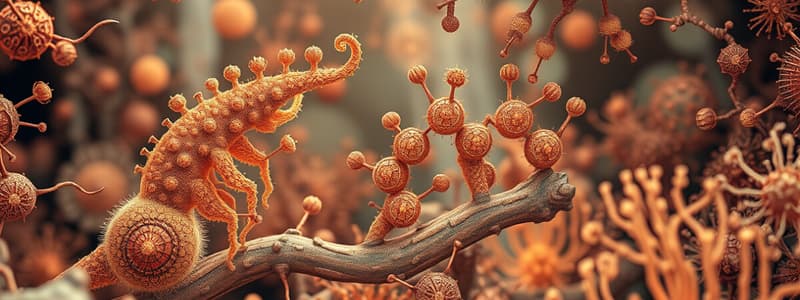Podcast
Questions and Answers
When did prokaryotes first appear on Earth?
When did prokaryotes first appear on Earth?
Which process accounts for most of the atmospheric oxygen on Earth?
Which process accounts for most of the atmospheric oxygen on Earth?
What role do microbes play in the decomposition of dead organisms?
What role do microbes play in the decomposition of dead organisms?
What is bioremediation primarily used for?
What is bioremediation primarily used for?
Signup and view all the answers
Which of the following is a product that can be produced using microbes?
Which of the following is a product that can be produced using microbes?
Signup and view all the answers
Which domain includes all microbes that can survive in extreme heat?
Which domain includes all microbes that can survive in extreme heat?
Signup and view all the answers
Which group of bacteria is known for being gram-positive?
Which group of bacteria is known for being gram-positive?
Signup and view all the answers
What type of prokaryotes are known for producing methane?
What type of prokaryotes are known for producing methane?
Signup and view all the answers
Which domain encompasses eukaryotes?
Which domain encompasses eukaryotes?
Signup and view all the answers
Which of the following is NOT a domain of life?
Which of the following is NOT a domain of life?
Signup and view all the answers
Study Notes
Microbial Discovery and Evolution
- Microbes, particularly prokaryotes, originated around 3.5 billion years ago and dominated Earth for over 1.5 billion years.
- Eukaryotes emerged approximately 2 billion years ago.
- The invention of the microscope revealed microorganisms, previously unknown to humanity.
Microbial Roles in the Environment
- Microbial photosynthesis is responsible for the majority of Earth's atmospheric oxygen.
- Essential for the decomposition process of dead organisms.
- Microbes cycle key elements such as sulfur (S), nitrogen (N), and phosphorus (P).
Significance of Microbiology
- Crucial for Earth’s life support systems, impacting agriculture, energy production, and environmental processes.
- Legumes and ruminants benefit from microbial interactions.
Harnessing Microbial Power
- Microbes are utilized in food microbiology for production and preservation (e.g., yogurt, cheese, salami).
- Significant producers of important compounds like antibiotics, monosodium glutamate (MSG), and ethanol.
Bioremediation Techniques
- Microbes can clean up toxic waste, employing both natural and engineered species.
- Effective bioremediation may involve multiple microbial types.
Biotechnology Advancements
- Recombinant and molecular biology techniques allow for manipulation of microbes to generate useful products.
- Agricultural microbiology embraces developing microbial solutions for crop improvement.
Classification of Microbial Life
- Carl Woese's three-domain system categorizes life into Archaea, Bacteria, and Eukarya based on genetic sequences.
- Archaea and Bacteria encompass all prokaryotes, with Eukarya including some types of microbes.
Historical Beginnings of Microbiology
- Antoni van Leeuwenhoek developed simple microscopes, observing microorganisms he termed "animalcules."
- Robert Hooke first published a depiction of microorganisms, studying the fruiting structures of molds.
The Golden Age of Microbiology
- Key questions included the validity of spontaneous generation, fermentation processes, disease causation, and methods to prevent infections.
- Spontaneous generation theorized life originated from non-living matter, while biogenesis emphasized life arising from existing organisms.
Francesco Redi's Experiment
- Redi challenged spontaneous generation by demonstrating maggots only formed on exposed meat, leading to clearer conclusions about decomposition.
Contributions of Other Scientists
- Louis Joblot suggested that microbial growth originates from external contamination rather than spontaneous generation.
- The combined insights of scientists like Franz Schulze and Theodor Schwann further elucidated microbial roles and contributions.
Understanding the Human Microbiome
- Human microbiome consists of approximately 100 trillion bacterial cells, outnumbering human cells at a ratio of up to 3:1.
- Benefits of the microbiome include aiding food digestion, vitamin synthesis, metabolic regulation, and immune system education.
Microbial Impacts on Health
- Alterations in the microbiome can affect vaccine effectiveness and drug metabolism.
- Changes in microbial communities may correlate with various health issues, including inflammatory bowel disease, obesity, and skin conditions.
Studying That Suits You
Use AI to generate personalized quizzes and flashcards to suit your learning preferences.
Related Documents
Description
Explore the fascinating world of microbes and their role in evolutionary biology through this quiz. Learn about the history of microbial life, their environmental impact, and how they laid the foundation for more complex life forms on Earth. Test your knowledge on the origins and significance of these microscopic organisms.




